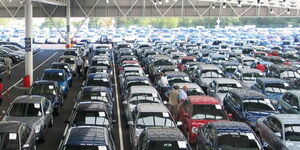On Monday, March 15, fuel prices in Kenya hit a 9-month high after the Energy and Petroleum Regulatory Authority (ERPA) announced the revised prices.
Kenyan motorists decried that the new prices would increase the cost of living factoring in public transport, electricity and commodities’ distribution which rely on fuel.
However, be that as it may, Kenyans.co.ke has compiled a list of driving tactics that will help reduce the amount of fuel your car consumes.
Aerodynamics
Designers and aerodynamicists spend ages trying to make a car’s body cut smoothly through the air and thus, opening your windows or sunroof, or piling bikes and luggage onto the roof, can heavily impact your fuel economy.
Your car will require more effort to cut through the drag created thus using more fuel.
Driving faster will also increase the wind resistance you encounter, causing your vehicle to use more fuel.
If you are driving at speeds of less than 56kph, it is usually okay to keep the windows down but at higher speeds, you should keep the windows up in order to reduce drag and improve fuel consumption
Accelerate and brake steadily
While driving, always apply steady and consistent pressure to your car's accelerator pedal. A heavy foot will always result in poor fuel consumption.
Aggressive driving forces your car to switch gears at a faster rate than is optimal for fuel-efficiency.
Frequent, heavy braking and quick acceleration could reduce your fuel economy by as much as 33% during highway driving.
Drive the speed limit
Always try to drive at or near the speed limit. The optimal travelling speed for every make and model vehicle is different. However, the faster you drive, the worse your fuel mileage and fuel consumption will be.
In most cars, the sweet spot is about 80kph to maintain reasonably good efficiency. Cars with bigger engines like V8s will usually be happiest sitting between 90kph and 100kph.
Reduce weight in the vehicle
You may be surprised, but every extra pound or kilogram matters and affects your fuel efficiency. So keep your boot and back seat clear of unnecessary items that just add weight to your vehicle.
For every 45kg of weight in the vehicle, your car's fuel economy decreases by about one or two percent.
Maintain the same speed/ Easy Gear Shifting
Maintaining the same speed means that there is no acceleration. No acceleration reduces the amount of work your engine does, and therefore it uses less fuel.
Many cars these days come with automatic transmission, but if you are still using the gear shift, consider shifting before the rev meter crosses the red line.
The higher gear you drive in, the lower your engine speed is, which can improve fuel efficiency. So change up a gear whenever you can, without labouring the engine.
Inflated Tyres
Ensure your tires are inflated to the proper air pressure level. Improperly inflated tires can reduce your car's fuel economy by up to five per cent in some cases.
Things to avoid
Idling gets you nowhere but still burns fuel. Turn the engine off when you’re in a queue, or waiting for someone, until you need it. As a rule, if you stop over 10 seconds, switch off your engine.
Air-conditioning increases fuel consumption, especially at low speeds.
If it’s a hot day, use the air conditioning for high-speed driving, but open the windows around when you want to drive at lower speeds.












